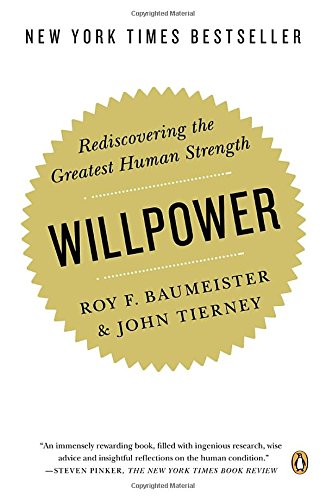Willpower Summary

5 min read ⌚
 Rediscovering the Greatest Human Strength
Rediscovering the Greatest Human Strength
We get it. Distractions and temptations follow you everywhere you turn.
However, if you want to live an accomplished and fulfilling life, you have to learn how to fight them.
In our summary of “Willpower”, we summarize why willpower is essential and how you can go about strengthening it.
Who Should Read “Willpower”? and Why?
Most people have high goals, especially when it comes to their self-improvement. However, more often than not, they fall short of their objectives (just think of all the New Year’s resolutions you have made throughout the years!).
In “Willpower,” social psychologist Roy F. Baumeister and New York Times writer John Tierney explain why that is the case, by sharing the results of a self-control study they have been doing for years.
Additionally, they offer you some tips and tools you can work with to strengthen what should be your biggest human strength.
We recommend this book to all people who just can’t say no – “Willpower” will make you understand why saying no does not work and will teach you what you can do instead.
About Roy F. Baumeister and John Tierney
 Roy F. Baumeister teaches psychology at Florida State University.
Roy F. Baumeister teaches psychology at Florida State University.
 John Tierney writes the science column Findings and works for The New York Times.
John Tierney writes the science column Findings and works for The New York Times.
“Willpower Summary”
You may hear about willpower more often in this modern age, but the concept is not new.
The idea of an inner human strength that protects humans against moral deceptions and temptations gained its popularity in the Victorian age. During that time, people debated if morality would shape human conduct in the absence of religion.
Oscar Wilde’s saying, “I can resist everything except temptation,” fueled the public worrying even more.
During the 60s, the idea of willpower weakened, when the “me generation” started spreading the “if it feels good to do it” way of life.
In the 70s, “self-esteem” took the stage, as researchers found out that people with self-confidence were happier than those without it.
The door of behavioral science was shut to willpower until the 80s.
Now, let’s move on to actual studies.
You must have heard about the marshmallow test. You have probably seen one of those famous videos that used it as an idea not long ago.
However, the original test was done in the 60s, when Walter Mischel took four-year-olds as his study subjects and decided to determine their ability to resist immediate gratification.
What consists the test?
Well, Mischel left the kids in a room with a marshmallow. He told them they could eat it right away, but that if they resisted it until he came back, he would give them two marshmallows.
The response was mixed. Some ate the marshmallows; some waited for another one.
It is interesting to note, however, that those who waited, did other activities to distract themselves.
Years later, when his study subjects have grown, Mischel’s daughter followed up on her father’s experiment. She found the participants and was surprised to learn that those that resisted their temptation had much better lives than those who did not: they were more popular, got better grades, earned more money, and were less prone to gaining weight and using drugs.
As you can see for yourself, studying self-control is much more efficient in forecasting adult behavior than any other test aimed at predicting college performance.
However, college performance is not everything.
Greater self-control can push you toward making more objective decisions, and thus, end up with a better quality of life.
Key Lessons from “Willpower”
1. The Accidental Discovery
2. The Behavior Track
3. The Dieting Dilemma
The Accidental Discovery
Researchers in Baumeister’s lab decided to put the Mardi Gras theory to the test: the idea that individuals who occasionally yield to temptation, can better cope with the weeks of denial that follow.
This study ended with an accidental discovery of a connection between willpower and glucose.
When exercising self-control, the human body depletes glucose. In other words, your body craves sugar to renew your levels of energy.
Below, we give you a few tips that you can use instead of giving in to the sugar cravings:
- “Feed the beast.”
Your body is the temple of your spirit. Do not skip meals, eat breakfast and do not take on demanding activities when you are hungry.
- “When you eat, go for the slow burn.”
Stay away from snacks, fast foods, white bread or rice. Instead, choose foods like lean meats, raw fruits, nuts, olive oil, and fish, which are healthier for your body and will keep you full longer.
- “When you are tired, sleep.”
Sleep is the way your body recovers. It also reduces your body’s requirements for glucose.
The Behavior Track
The first step towards strengthening your self-control is setting objectives, and measuring your progress.
The good news is that we live in a technological era in which tracks your progress. Tons of websites can help you with scheduling, with finances, calorie counting, exercise timetables, sleep patterns, etc.
You can also access numerous support boards online, in which you will find motivation whenever you feel you start lacking it.
Your brain is a muscle, and willpower is one too. All bits of your character respond to exercises.
The more you exercise it, the easier it will get. We promise you that.
However, you have to be ready to make more than just a few simple exercises and to be dedicated and constant.
The Dieting Dilemma
Most of the world’s population believes that being overweight is a result of weak willpower.
However, many others, among which Oprah Winfrey, one of the most famous dieters, disapprove this notion. She is a prime example of how people with extraordinary self-control, who had managed to achieve almost everything in life, struggle with weight.
The problem you may be facing is trying to give up the things you are used to too soon.
Never promise yourself to completely get rid of chocolate or any other food for that matter, from your diet. Instead, focus on setting small, but realistic goals that will make gradual changes to your lifestyle.
One of the most effective dieting tips is trying the postponed pleasure ploy, in which you promise yourself a treat when you achieve a specific goal.
In any case, no dieting strategy will work the same for everyone. Find the one just for you and follow it, regardless of how slow it may seem.
And do not remember, do not confuse the amount of weight with the level of willpower.
Like this summary? We’d Like to invite you to download our free 12 min app, for more amazing summaries and audiobooks.
“Willpower” Quotes
Self-control is ultimately about much more than self-help. It’s essential for savoring your time on Earth and sharing joy with the people you love. Share on X Research into willpower and self-control is psychology’s best hope for contributing to human welfare. Share on X Self-control turned out to be most effective when people used it to establish good habits and break bad ones. Share on X When people have to make a big change in their lives, their efforts are undermined if they are trying to make other changes as well. Share on X A personal goal can seem more real once you speak it out loud, particularly if you know the audience will be monitoring you. Share on XOur Critical Review
The authors created “Willpower” as a self-help book meant for helping people correct bad habits. However, for such a book, readers may find it too academic, since it is filled with study citations. On the other hand, it gives a fascinating and well-researched background on willpower.








